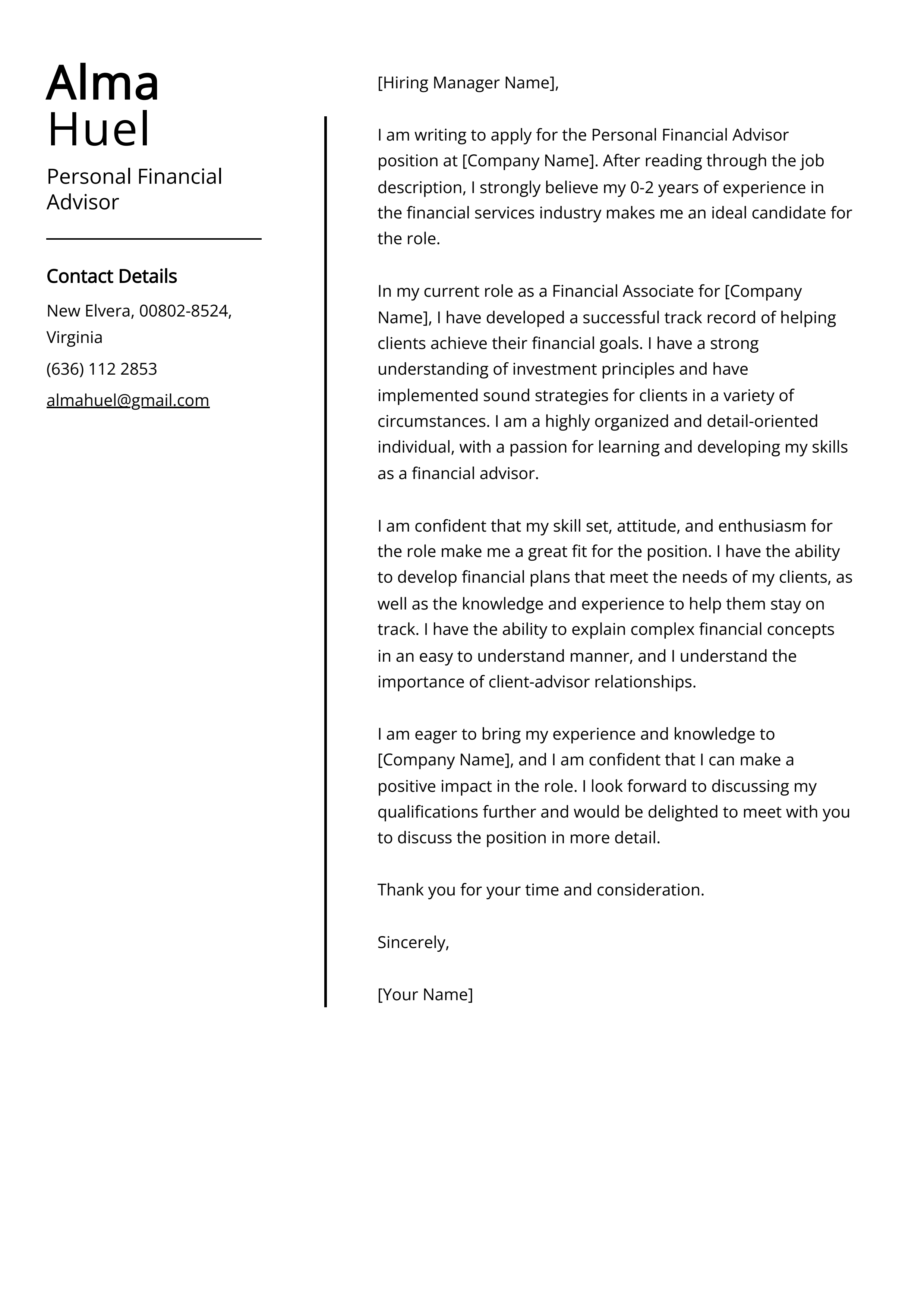A personal financial advisor typically works in financial institutions, private firms, or as independent consultants. They may also operate from home offices.
Personal financial advisors help individuals manage their finances effectively. They provide advice on investments, taxes, insurance, and retirement planning. These professionals often work in banks, investment firms, or insurance companies. Some choose to run their own consulting businesses or work from home offices.
Their goal is to help clients achieve financial stability and reach their financial goals. Personal financial advisors use their expertise to create customized financial plans. They monitor clients’ financial health and adjust strategies as needed. This personalized service ensures clients make informed financial decisions.
Corporate Offices
A personal financial advisor can work in various settings, one of which is corporate offices. These offices can be part of large firms or boutique firms. Each type of firm offers unique opportunities and environments for financial advisors.
Large Firms
Large firms typically have extensive resources and a vast client base. Advisors in these firms often manage diverse portfolios and handle numerous clients.
Key benefits of working in large firms include:
- Access to a wide range of financial products
- Comprehensive training programs
- Robust support systems
- Potential for high earnings
Some well-known large firms are:
| Firm Name | Location |
|---|---|
| Goldman Sachs | New York, NY |
| Morgan Stanley | New York, NY |
| J.P. Morgan | New York, NY |
Boutique Firms
Boutique firms are smaller and more specialized. They often focus on niche markets or specific financial services. Advisors in boutique firms enjoy a more personalized work environment.
Key benefits of working in boutique firms include:
- Closer client relationships
- Flexible work arrangements
- Specialized expertise development
- Collaborative team culture
Examples of boutique firms include:
| Firm Name | Location |
|---|---|
| Evercore | New York, NY |
| Houlihan Lokey | Los Angeles, CA |
| William Blair | Chicago, IL |

Credit: www.bls.gov
Banks And Credit Unions
Personal financial advisors often work in banks and credit unions. These institutions provide diverse opportunities for advisors to help clients manage their finances. They assist with savings, loans, and investment strategies. Let’s explore two main areas where these professionals operate: Retail Banking and Private Banking.
Retail Banking
In retail banking, personal financial advisors help everyday customers. They guide clients on savings accounts, checking accounts, and personal loans. Advisors also assist with credit card selections and understanding interest rates. Their goal is to help clients achieve financial stability and growth. Here are some key services they provide:
- Opening new accounts
- Advising on loan options
- Helping with credit card management
- Providing financial education
Retail banking is crucial for community financial well-being. Advisors build trust and long-term relationships with clients.
Private Banking
Private banking focuses on high-net-worth individuals. Personal financial advisors in this sector provide tailored financial services. They manage large investment portfolios and complex financial needs. Advisors offer personalized advice on wealth management, estate planning, and tax strategies.
Key services in private banking include:
- Investment management
- Estate planning
- Tax advisory services
- Personalized financial planning
Private banking clients receive exclusive services and attention. Advisors in this field often have extensive experience and specialized knowledge.
Both retail and private banking play vital roles in the financial industry. Personal financial advisors in these areas ensure clients’ financial health and growth.
Insurance Companies

Personal financial advisors often work with insurance companies. These companies offer various insurance products. Financial advisors help clients choose the best options. They ensure clients understand their insurance policies and benefits.
Life Insurance
Many advisors work with life insurance companies. They help clients select the right life insurance plans. Life insurance provides financial security for families. Advisors explain the different types of life insurance. These include term life, whole life, and universal life insurance. Advisors ensure clients know the benefits and costs of each type.
Property And Casualty
Financial advisors also work with property and casualty insurance companies. These companies offer insurance for homes, cars, and businesses. Advisors help clients understand their coverage options. They explain the importance of having the right insurance. Advisors also assist in comparing policies and premiums. They ensure clients get the best protection for their needs.
| Insurance Type | Benefits | Coverage |
|---|---|---|
| Life Insurance | Provides financial security for families | Term Life, Whole Life, Universal Life |
| Property and Casualty | Protects homes, cars, and businesses | Home, Auto, Business Insurance |
- Life Insurance: Secures family finances
- Term Life: Coverage for a specific period
- Whole Life: Lifetime coverage with savings
- Universal Life: Flexible premiums and benefits
- Property and Casualty: Protects physical assets
- Home Insurance: Covers damage to property
- Auto Insurance: Covers vehicle damage and liability
- Business Insurance: Protects business assets and operations
Investment Firms
Personal financial advisors work in various settings. One common place is investment firms. These firms help clients grow their wealth. Advisors in these firms offer financial guidance and investment strategies.
Brokerage Houses
Brokerage houses are a type of investment firm. They allow clients to buy and sell securities. Personal financial advisors in brokerage houses guide clients through these transactions. They help clients make smart investment choices. This advice is based on the client’s financial goals and risk tolerance.
Mutual Fund Companies
Mutual fund companies are another type of investment firm. They pool money from many investors to buy securities. Personal financial advisors help clients choose the right mutual funds. They explain the benefits and risks of each option. This helps clients make informed decisions.
| Investment Firm | Role of Personal Financial Advisor |
|---|---|
| Brokerage Houses | Guide clients in buying and selling securities |
| Mutual Fund Companies | Help clients choose suitable mutual funds |
Independent Practices
Personal financial advisors often choose to work in independent practices. These practices offer flexibility and control over their work. Advisors can decide on their client base and services. This setup fosters a personalized approach to financial advice.
Solo Practitioners
Some personal financial advisors work as solo practitioners. They operate alone, managing all aspects of their business. This includes client meetings, financial planning, and administrative tasks. Working solo allows advisors to build strong, personal relationships with clients.
Solo practitioners enjoy complete autonomy over their schedules. They can tailor services to meet client needs. This approach often leads to high client satisfaction and loyalty. Advisors can also focus on niche markets if they choose.
Below is a table showing the key benefits and challenges of solo practice:
| Benefits | Challenges |
|---|---|
| Full control over business | Managing all tasks alone |
| Personal client relationships | Limited time for each client |
| Flexibility in services offered | Need for diverse skill sets |
Small Partnerships
Other advisors form small partnerships to share responsibilities. This setup involves two or more advisors working together. Partnerships can leverage diverse skills and expertise. Advisors can specialize in different areas of financial planning.
Small partnerships offer a balance between independence and support. Partners share administrative duties, reducing individual workload. They can also cover for each other during absences. This provides consistent service to clients.
Here are some advantages of small partnerships:
- Shared responsibilities
- Diverse expertise
- Consistent client service
- Collaborative decision-making
Both solo practitioners and small partnerships have unique benefits. Independent practices provide a rewarding path for personal financial advisors.
Online Platforms
Personal financial advisors are embracing the digital age. They now work through various online platforms. These platforms offer convenience and accessibility. Clients can connect with advisors from anywhere in the world.
Robo-advisors
Robo-advisors use algorithms to manage investments. They require minimal human intervention. Clients answer questions about their financial goals. The robo-advisor then makes investment decisions for them.
Robo-advisors are cost-effective. They typically charge lower fees than human advisors. They are available 24/7, providing constant monitoring of investments.
Virtual Consultations
Many advisors offer virtual consultations. These are done through video calls. Clients can discuss their financial plans without leaving their homes.
Virtual consultations are flexible. They save time and travel costs. Advisors can share screens to review documents in real-time. This makes the process smooth and interactive.
| Platform | Features |
|---|---|
| Robo-Advisors | Algorithm-based, Low Fees, 24/7 Monitoring |
| Virtual Consultations | Video Calls, Real-Time Document Sharing, Flexible Scheduling |
Educational Institutions
Personal financial advisors play a crucial role in educational institutions. These professionals help students and staff manage their finances. They offer guidance on budgeting, saving, and investing. Educational institutions provide various platforms for financial advisors to work.
University Programs
Universities often have dedicated programs for financial education. These programs help students understand money management. Advisors conduct workshops, seminars, and one-on-one sessions. They teach students about budgeting, saving, and investing. Financial advisors also assist in planning for student loans and scholarships.
Below is a table showing typical university programs involving financial advisors:
| Program Type | Description |
|---|---|
| Workshops | Group sessions on various financial topics. |
| Seminars | Detailed presentations on financial planning. |
| One-on-One Sessions | Personalized financial advice for students. |
Financial Literacy Workshops
Financial literacy workshops are essential in educational settings. These workshops aim to build financial awareness among students and staff. Financial advisors conduct these workshops to cover various topics. Below are some common topics covered:
- Budgeting
- Saving strategies
- Investment basics
- Debt management
Workshops often include interactive sessions and practical exercises. These sessions help participants apply what they learn in real life. Financial advisors use simple language and examples. This approach makes complex financial concepts easy to understand.

Credit: resumaker.ai
Government Agencies
Personal financial advisors often find rewarding careers in government agencies. These roles contribute to financial stability and public education. Working in a government setting offers unique challenges and opportunities.
Financial Regulation
Government agencies play a crucial role in financial regulation. Advisors here ensure compliance with laws and rules. They monitor financial institutions and markets. Their work helps maintain fair and transparent financial systems.
Regulatory tasks may include:
- Auditing financial transactions
- Inspecting financial records
- Ensuring compliance with financial laws
Public Financial Education
Advisors in government agencies also focus on public financial education. They help citizens understand financial concepts and decisions. This work is vital for empowering communities with knowledge.
Education initiatives may involve:
- Hosting financial literacy workshops
- Creating educational materials
- Providing one-on-one financial counseling
Overall, personal financial advisors in government agencies play a key role. They ensure financial stability and educate the public on managing money.

Credit: money.usnews.com
Frequently Asked Questions
Where Do Most Financial Advisors Work?
Most financial advisors work in banks, investment firms, and insurance companies. Some operate independently or as part of small firms.
What Is The Work Environment Of A Personal Financial Advisor?
Personal financial advisors often work in offices or remotely. They meet clients, analyze financial data, and develop plans. The environment is typically professional and client-focused.
What Is The Role Of A Personal Financial Advisor?
A personal financial advisor helps clients manage their finances. They offer advice on investments, savings, insurance, and retirement planning.
Are Personal Financial Advisors Worth It?
Yes, personal financial advisors are worth it. They provide expert guidance, help manage investments, and plan for future financial goals.
Conclusion
Personal financial advisors work in various settings, from banks to private firms and even as independent consultants. Their expertise helps clients manage finances effectively. Understanding their work environment can guide you in choosing the right advisor. Remember, the right advisor can make a significant difference in your financial health.

